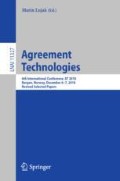Abstract
The game of Diplomacy has been used as a test case for complex automated negotiations for a long time, but to date very few successful negotiation algorithms have been implemented for this game. We have therefore decided to include a Diplomacy tournament within the annual Automated Negotiating Agents Competition (ANAC). In this paper we present the setup and the results of the ANAC 2017 Diplomacy Competition and the ANAC 2018 Diplomacy Challenge. We observe that none of the negotiation algorithms submitted to these two editions have been able to significantly improve the performance over a non-negotiating baseline agent. We analyze these algorithms and discuss why it is so hard to write successful negotiation algorithms for Diplomacy. Finally, we provide experimental evidence that, despite these results, coalition formation and coordination do form essential elements of the game.
Access this chapter
Tax calculation will be finalised at checkout
Purchases are for personal use only
Notes
- 1.
- 2.
- 3.
One might argue that Diplomacy does have hidden information, because players make secret agreements. However, these agreements have no formal meaning, and form part of the players’ strategies rather than of the rules of the game. Therefore, formally speaking there is no hidden information.
- 4.
- 5.
- 6.
It would have been better to assign each agent to each Power an equal number of times, because some Powers are stronger than others. Unfortunately, however, the Parlance game server does not provide this option.
- 7.
With respect to the null-hypothesis that each agent has a mean score of \(\frac{34}{7}\) Supply Centers per game.
- 8.
Table 5 shows a value of 9.08 instead of 9.09. This difference is due to rounding errors.
References
Aydoğan, R., Fujita, K., Baarslag, T., Jonker, C.M., Ito, T.: ANAC 2017: repeated multilateral negotiation league. In: The 11th International Workshop on Automated Negotiation, ACAN 2018 (2018)
Aydoğan, R., et al.: A baseline for nonlinear bilateral negotiations: the full results of the agents competing in ANAC 2014, pp. 96–122. Bentham Science Publishers (2017)
Baarslag, T., Aydoğan, R., Hindriks, K.V., Fuijita, K., Ito, T., Jonker, C.M.: The automated negotiating agents competition, 2010–2015. AI Mag. 36(4), 115–118 (2015)
Baarslag, T., Hindriks, K., Jonker, C., Kraus, S., Lin, R.: The first Automated Negotiating Agents Competition (ANAC 2010). In: Ito, T., Zhang, M., Robu, V., Fatima, S., Matsuo, T. (eds.) New Trends in Agent-Based Complex Automated Negotiations. SCI, vol. 383, pp. 113–135. Springer, Heidelberg (2012). https://doi.org/10.1007/978-3-642-24696-8_7
Fabregues, A.: Facing the challenge of human-aware negotiation. Ph.D. thesis, Universitat Autònoma de Barcelona (2012)
Fabregues, A., Sierra, C.: DipGame: a challenging negotiation testbed. Eng. Appl. Artif. Intell. 24(7), 1137–1146 (2011)
Ferreira, A., Lopes Cardoso, H., Reis, L.P.: DipBlue: a diplomacy agent with strategic and trust reasoning. In: ICAART 2015 - Proceedings of the International Conference on Agents and Artificial Intelligence, Lisbon, Portugal, 10–12 January 2015, vol. 1, pp. 54–65. SciTePress (2015)
Fujita, K., Aydoğan, R., Baarslag, T., Ito, T., Jonker, C.: The fifth Automated Negotiating Agents Competition (ANAC 2014). In: Fukuta, N., Ito, T., Zhang, M., Fujita, K., Robu, V. (eds.) Recent Advances in Agent-based Complex Automated Negotiation. SCI, vol. 638, pp. 211–224. Springer, Cham (2016). https://doi.org/10.1007/978-3-319-30307-9_13
de Jonge, D., Sierra, C.: NB3: a multilateral negotiation algorithm for large, non-linear agreement spaces with limited time. Auton. Agent. Multi-Agent Syst. 29(5), 896–942 (2015)
de Jonge, D., Sierra, C.: D-Brane: a diplomacy playing agent for automated negotiations research. Appl. Intell. 47(1), 158–177 (2017)
de Jonge, D., Zhang, D.: Automated negotiations for general game playing. In: Proceedings of the 16th Conference on Autonomous Agents and MultiAgent Systems, AAMAS 2017, São Paulo, Brazil, 8–12 May 2017, pp. 371–379. ACM (2017)
Marinheiro, J., Lopes Cardoso, H.: Towards general cooperative game playing. In: Nguyen, N.T., Kowalczyk, R., van den Herik, J., Rocha, A.P., Filipe, J. (eds.) Transactions on Computational Collective Intelligence XXVIII. LNCS, vol. 10780, pp. 164–192. Springer, Cham (2018). https://doi.org/10.1007/978-3-319-78301-7_8
Mell, J., Gratch, J., Baarslag, T., Aydoğan, R., Jonker, C.: Results of the first annual human-agent league of the automated negotiating agents competition. In: Proceedings of the 2018 International Conference on Intelligent Virtual Agents (2018)
Ephrati, E., Kraus, S., Lehman, D.: An automated diplomacy player. In: Levy, D., Beal, D. (eds.) Heuristic Programming in Artificial Intelligence: The 1st Computer Olympia, pp. 134–153. Ellis Horwood Limited, Chicester (1989)
Silver, D., et al.: Mastering the game of go with deep neural networks and tree search. Nature 529(7587), 484–489 (2016)
Acknowledgments
This work is part of the Veni research programme with project number 639.021.751, which is financed by the Netherlands Organisation for Scientific Research (NWO), and project LOGISTAR, funded by the E.U. Horizon 2020 research and innovation programme, Grant Agreement No. 769142.
Author information
Authors and Affiliations
Corresponding author
Editor information
Editors and Affiliations
Rights and permissions
Copyright information
© 2019 Springer Nature Switzerland AG
About this paper
Cite this paper
de Jonge, D., Baarslag, T., Aydoğan, R., Jonker, C., Fujita, K., Ito, T. (2019). The Challenge of Negotiation in the Game of Diplomacy. In: Lujak, M. (eds) Agreement Technologies. AT 2018. Lecture Notes in Computer Science(), vol 11327. Springer, Cham. https://doi.org/10.1007/978-3-030-17294-7_8
Download citation
DOI: https://doi.org/10.1007/978-3-030-17294-7_8
Published:
Publisher Name: Springer, Cham
Print ISBN: 978-3-030-17293-0
Online ISBN: 978-3-030-17294-7
eBook Packages: Computer ScienceComputer Science (R0)

